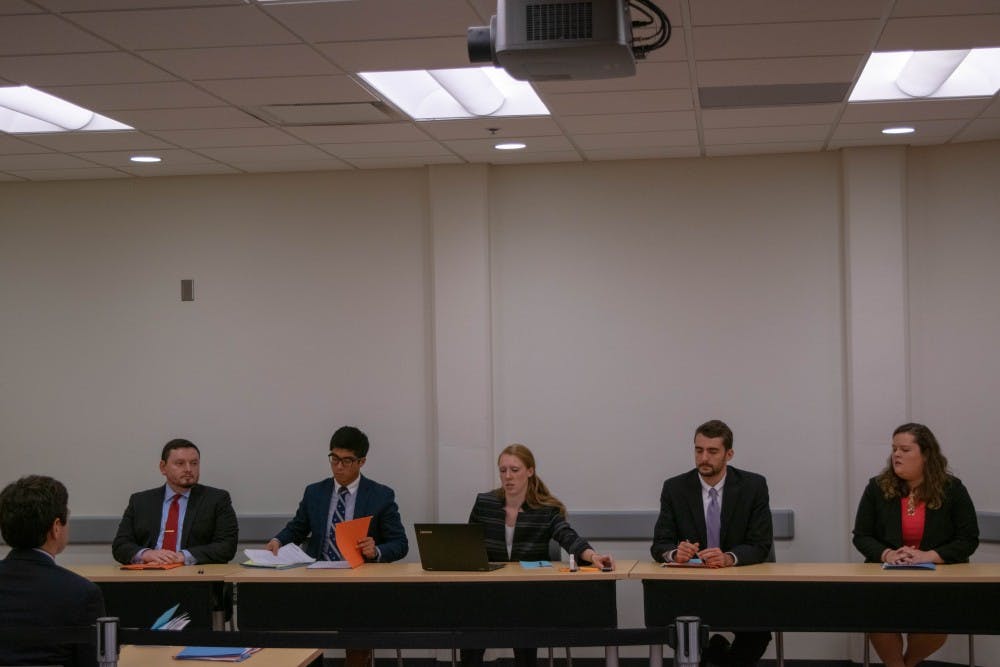“We found out who Frank Pray was, we found a provision in the Instrument that allowed her to remove him – Clare didn’t find any of these things, Clare didn’t have the familiarity with the Instrument, Clare didn’t do the background on any of the members of the panel,” Deutschbein said. “Basically, the community was running Maya Little’s defense and Clare was just up there embarrassing herself over and over again. It was concerning.”
Little was found guilty by the Honor Court of violating Section II.C.2.A of the Instrument of Student Judicial Governance and was sanctioned with a written letter of warning and 18 hours of community service. Little’s case was later dismissed by the University Hearings Board, which cited a violation of Little’s basic rights.
“To me, this represented a lack of understanding of the Instrument, again a main component of the attorney general’s duties,” Reeves said.
At both Monday’s interview and Tuesday’s confirmation vote, Reeves asked Kurdys if she would have charged Little had she been the attorney general.
Kurdys said yes at the interview Monday, Reeves and Deutschbein said. At Tuesday’s meeting, she backtracked, saying that she should not have answered the question, according to Reeves and Deutschbein.
“In the Instrument, if we just starting reading it, it says, ‘Oh, the purpose of the Honor Court is to protect the University’s reputation,’” Deutschbein said. “It is really difficult to imagine how charging basically a civil rights activist with an all-white jury in a student setting that’s already been exonerated by the Orange County justice system — that didn’t feel like it was helping the University’s reputation.”
Little was found guilty in October by an Orange County District judge for defacing Silent Sam, but was given a prayer for judgment continued, meaning that there was no technical conviction. Charges of inciting a riot and misdemeanor assault of a government official against Little that stemmed from a December protest were dismissed in March.
After the Senate questioned Kurdys, she was asked to leave the room while the Senate discussed.
After a motion to close the discussion narrowly passed, Sen. Ryan Collins motioned to table the nomination.
Hernandez has not yet nominated a candidate for the Honor Court chairperson position. The chairperson is responsible for the recruiting, nomination, training, certification and oversight of members of the GPSF, according to the GPSF code. Hernandez did not respond to an email from The Daily Tar Heel by the time of publication requesting comment regarding why he has not made a nomination.
“We spoke to him about this briefly,” Deutschbein said. “We’re like, ‘Where’s the Honor Court chair?’ He’s like, ‘I’m looking, trying to find someone, got some applicants but they have some problems and I don’t feel comfortable moving forward with them.’”
The GPSF is working on providing an opportunity for Kurdys to meet with senators and is evaluating possible paths forward to fill the offices of attorney general and Honor Court chairperson, incoming GPSF President Chastan Swain said in an emailed statement Wednesday.
To get the day's news and headlines in your inbox each morning, sign up for our email newsletters.
“I am confident that moving forward we will be able to improve these institutions,” Swain said in the email. “Despite the challenges and flaws that have been exhibited this year, I hope that Carolina gradaute (sic) and professional students do not lose sight of the importance of a functioning judicial system and honor court, because these institutions are a critical component in upholding the integrity of the Carolina community.”
Kurdys said via email that she has let leadership know that she is available for another panel or meeting to answer remaining questions about her qualifications or plans for office.
As for what happens next, many aren’t sure. With the last scheduled meeting of the GPSF Senate over, the Graduate Honor Court is still without an Honor Court chairperson, an attorney general, or an outgoing GPSF president to make a nomination for either position.
The GPSF Code does not contain any provisions for what to do in scenarios like this, Deutschbein said. For now, he said, his opinion is that the Honor Court has ceased legitimate functioning.
“I don’t know what will happen to the Honor System. That’s a question for GPSF leadership, and ultimately University administration,” Kurdys said. “For now, I am still a member of AG staff and we are coordinating with the Honor Court and the Office of Student Conduct to work through the cases that we can as outlined in the Instrument of Student Judicial Governance. You should probably expect to sign your blue books and Scantrons.”
The Honor System for both undergraduate and graduate students is still in effect, UNC Media Relations said in an email.
@21taylorpot
university@dailytarheel.com




